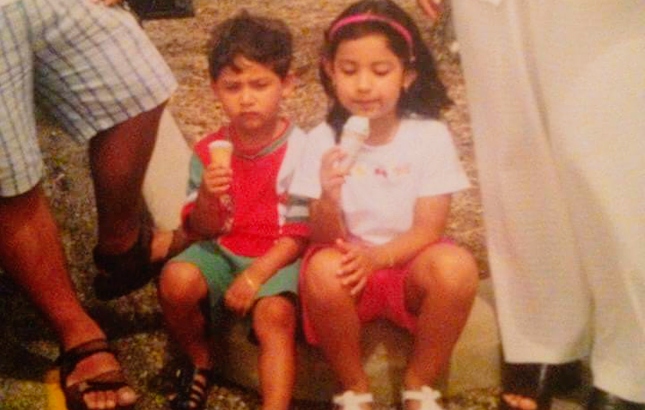Notes On Growing Up Bilingual

I didn’t realize you were not supposed to pronounce the “L” in “salmon” until a friend pointed out that I was having “sahhhmon” not “salllmon” for dinner. I was 12 and embarrassed. To this day I actively avoid saying “calf” because I know if I don’t think about it before I say it, I’ll mispronounce it and feel mortified all over again.
My parents actively decided we would only speak Spanish at home when I was born. The main motivation, I think, was family. My family is mixed and I have cousins that understand Spanish but can’t speak it, and other cousins that can do neither. The fact that they can’t speak to my grandparents or some of my aunts and uncles is, in my mom’s eyes, a tragedy.
When I started school and got to an age where it was acceptable to invite friends over to the house, I would spend hours the day before begging my mom to speak to me in English when they were over just so that we could “be normal.” She would refuse and I would convince my friends that we should go to their house instead. It wasn’t shame exactly, but I didn’t want to be different. Milwaukee, Wisconsin, where I was born and raised, is one of the most segregated cities in the country. There’s a German neighborhood, an African American neighborhood, an Irish neighborhood…you get the point. In an effort live in a district with a good school, my parents decided to settle in the Polish neighborhood. My olive skin and dark hair already stood out among my classmates - I didn’t want them to realize that besides looking different I also spoke different. One day I asked my mom if I could change my last name to end in “-ski” like the rest of my Polish friends’ last names. I think that was the last straw because the next year she enrolled my brother and me in a Spanish-English bilingual elementary school. It helped us learn Spanish grammar but, as you can imagine, there aren’t that many Latin immigrants in Wisconsin so my feelings of inadequacy didn’t really go away in a new school. Plus, I was jealous of some of my cousins whose parents had enrolled them in a French-English school, which sounded cool to me then.
When I started high school, I immediately enrolled in French without even giving a second of consideration to Latin or German, the other two options. It wasn’t until then that I realized speaking Spanish might be of some benefit other than being able to speak to my grandma. French came to me much quicker and easier than my peers who only spoke one language. The straight-A overachieving nerd in me was delighted. I moved quickly through French and having discovered a passion for learning languages, I recruited my friend Ayah to learn Russian with me during lunch (told you, I was a nerd).
Ayah, whose parents immigrated to the US from Jordan, is still one of my closest friends. There are things you don’t have to explain to someone else with immigrant parents. No matter if they are from Jordan, India, or China, we all know what it feels like to know a language so fluently that when you switch language you also switch culture. We know what it’s like not to know hit songs from the 90s because we grew up listening to our parents play hits from another country. We know the responsibility you feel when your parents ask you to translate for them. The weird feeling having to translate in real-time not just the words but also the meaning and intent behind them. How sometimes even when you translate something perfectly, it doesn’t feel the same in the other language. How in some way, you always feel like you need to be successful enough to make up for the sacrifices your parents made.
Since we were in high school, Ayah has learned Spanish, Danish, Swedish, Norwegian, and I don’t even remember how many other languages, and she’s currently pursuing a PhD. in math (once a nerd…). I stuck with French and Russian in college, and got lucky enough to get a research stint for 3 months in St. Petersburg, Russia the summer before my senior year. I don’t know what it would be like to travel without growing up the way I did, but I imagine it wouldn’t be as magical.
It breaks my heart now to remember the things I would say to my parents when I was little. I said things innocently, without thinking, and without malice, but I’m sure it hurt them to hear me ask them if we could be “more American,” whatever that means.